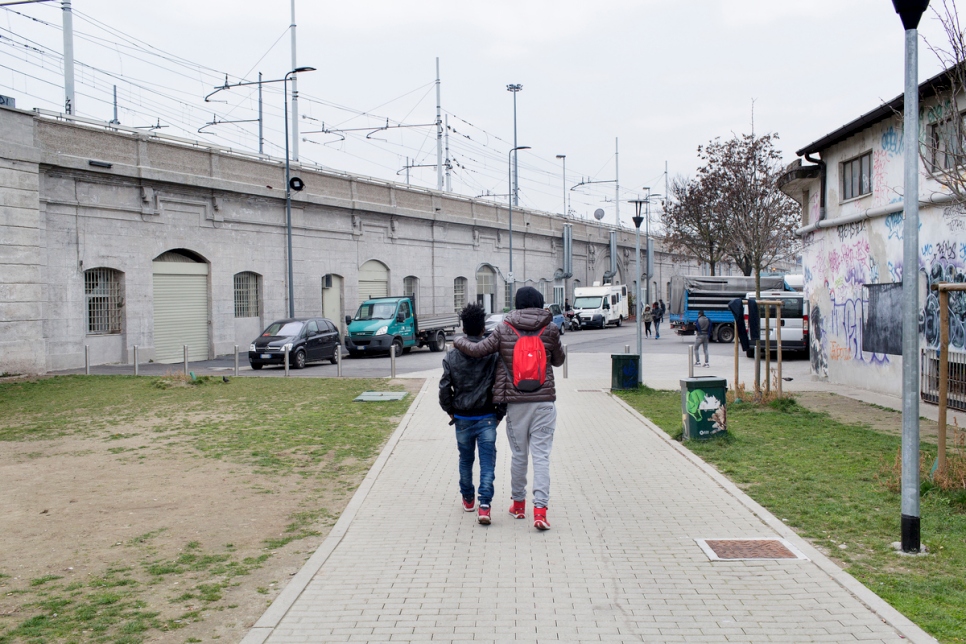Refugees face desperate journeys to reach loved ones in Europe
A 10-year-old boy survived the desert and the sea but his hopes of being reunited with his aunt in the Netherlands are fading.
Fourteen-year-old Eritrean refugee Solomon* outside a refugee shelter in Milan.
© UNHCR/Alessandro Penso
Solomon* was just 10 years old when he was forced to flee his home in Eritrea. Now 14, he has been living alone in a transit reception facility for months.
He is one of some 33,000 unaccompanied children who arrived in Italy by sea between January 2016 to June 2017. Many have experienced a wide range of abuses on the way, including sexual and gender-based violence, and been forced to deal with psychological and physical issues alone.
Solomon was exploited by smugglers as he travelled through Sudan and Libya in the hope of reaching Europe. “We got sold in the Sahara then again in Libya where we stayed for seven months,” he says. “It was very difficult, very difficult. You give up on your life. They made us pay a lot of money. One buys you then sells you, then another one sells you.”
“It was very difficult, very difficult. You give up on your life."
In Libya, he was held by smugglers for a month. He lived in a room with hundreds of other refugees and migrants, where he was given little food and beatings occurred every day. When Solomon and the rest of the group were finally taken to board a boat bound for Italy, they were crammed onto it along with hundreds of other people.
“There were 900 people on the boat,” Solomon recalls. “We took off at night at about six or seven. It was difficult – the sea was rough, people were fighting, people died, some from anxiety and some from the fighting. Many people died. It was scary but what can you do when you don’t have a choice? You cannot be scared because sooner or later you have to cross.”
After two days at sea, Solomon’s boat was rescued and taken to Italy, where he was placed in a community centre for unaccompanied children.
Although he was finally safe, Solomon still hoped to be reunited with his aunt in the Netherlands. Like countless others separated from loved ones, long waiting times soon compelled him to take matters into his own hands once more, risking abuse, violence and exploitation.
"Children should not expose themselves to such risks," says Stephane Jaquemet, UNHCR Regional Representative for Southern Europe. "Family reunion across borders needs to improve, not only to avoid these dangers, but also to restore the hope and the trust of children like Solomon."
With a group of teenagers, Solomon set out at night with only a backpack and a flashlight, following the train tracks. When the tracks entered tunnels in the mountainside, he and his friends would start running and praying that a train would not come at that moment – if it had, there would have been no way for them to escape being run over.
Their journey came to an end when border police detained them and returned them to Italy. Today, Solomon is still waiting to be reunited with his beloved aunt.
A report published by UNHCR, the UN Refugee Agency, illustrates that many people like Solomon make such desperate and dangerous journeys partly due to the lack of safe and legal pathways.
The study found that while the overall number of Mediterranean crossings fell sharply in the first half of this year, compared to the same period in 2016, the likelihood of dying among people seeking to reach Europe is still alarmingly high.
The report says an estimated 2,253 people died or went missing at sea during the period, and at least 40 died on land routes at or near European borders. As most people travel clandestinely, such information is hard to confirm and these estimates are considered conservative. Violence and abuse along the journey, most notably in Libya, are rife.
UNHCR has urged states to simplify incredibly lengthy and cumbersome procedures for people willing to reunite with their family members. It is also encouraging states to increase the speed of relocation for eligible asylum-seekers in Italy, including unaccompanied children, as a gesture of solidarity towards Italy.
Despite the high number of eligible applicants, like Solomon, only a few isolated cases of relocation of minors from Italy have succeeded. To address this, specific measures for unaccompanied children and more effective responsibility sharing and solidarity amongst EU member states are needed.
“Taking measures to reduce the number of refugees and migrants arriving in Europe, without at the same time stepping up peace-making, development, and safe pathways is morally unacceptable,” said High Commissioner for Refugees Filippo Grandi said in a statement.
* Name has been changed for protection reasons
This story is one of a series highlighting desperate journeys. You can read about the deadly human smuggling trade through Niger.

